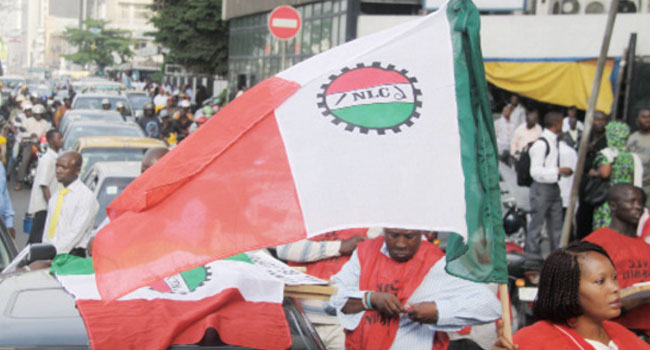The Organised Labour in Nigeria on Wednesday rose in protest, harassing and intimidating the National Assembly over the legislative process to decentralize negotiation and implementation of minimum wage in the country. The federal lawmakers are considering a bill to move the minimum wage from the exclusive to the concurrent list in the country’s constitution.
The National Assembly is on the path of responding to popular demands for restructuring and devolution of powers from the federal to the state governments before the uprising of the organised labour to obstruct the process for peculiar interest. The federal lawmakers may have touched on a sensitive issue of peculiar interest to the leaders of the Nigeria Labour Congress (NLC) and other affiliates who perhaps fear the law may have multiplier effect in unbundling the labour unions. The Organised Labour in their protest invaded the National Assembly complex, Abuja, agitating for the withdrawal of the proposed bill to move the National Minimum Wage from the exclusive to the concurrent legislative list.
While the Labour leaders have the right to protest, they cannot attest that the existing Minimum Wage is being implemented in the 36 states of the federation including Abuja and the federal government. not all states were paying the N18,000 before the new N30,000 Minimum Wage. Decentralizing the Minimum Wage and moving it to the concurrent list in the constitution, empowers respective states to negotiate and agree on what they have the capacity to pay. Besides, allocations from federation account to states are not parallel, some receive more than the others. The same applies to internally generated revenue (IGR).
Hon. Garba Mohammed is sponsoring a bill on Minimum Wage in the House of Representatives, seeking to decentralize Minimum Wage negotiation and implementation across the country. The expectation is that such constitutional review will empower both the Federal and state governments to negotiate the minimum wage with workers in accordance with the federal system and the capacity to accomplish the agreement.
The minimum wage bill is a clear step towards gradual restructuring of the country.
The Nigeria Labour Congress and its affiliates on Wednesday invaded the National Assembly, defied security personnel protocols to force their way through the gate into the complex.
The Deputy Chief Whip of the Senate, Sabi Abdullahi, received the protesters, who had insisted on seeing the President of the Senate, Ahmad Lawan.
The NLC President, Ayuba Wabba, threatened the Senate President, Lawan, and the Speaker of the House of Representative, Rt. Hon. Femi Gbajabimila, who were not on seat at the time they stormed the National Assembly, that if nothing is done to stop the bill, and ensure implementation of the national minimum wage, the labour unions will have no option than to declare an indefinite national strike.
The NLC President and TUC President later presented the letter of protest to both the Speaker of the House of Representatives and the Senate President. The letter was received by Sen. Sabi Abdullahi for the Senate President and Ado Doguwa for the Speaker of the House of Representatives.
Hon. Doguwa, however, told the labour leaders that the is just beginning to pass through the legislative processes, saying that House will conduct public hearing for inputs from the various stakeholders, including the Organised Labour. But the protesters insisted that all they are asking for is for the lawmakers to kill bill.
In spite of the intimidation by the labour leaders, the National Assembly will surely pass the test of the federalists and advocates of restructuring in Nigeria.

 Health & Fitness7 days ago
Health & Fitness7 days ago
 Aviation1 week ago
Aviation1 week ago
 Aviation1 week ago
Aviation1 week ago
 Aviation1 week ago
Aviation1 week ago
 Aviation7 days ago
Aviation7 days ago
 Inspirational6 days ago
Inspirational6 days ago
 Featured5 days ago
Featured5 days ago
 Crime5 days ago
Crime5 days ago

